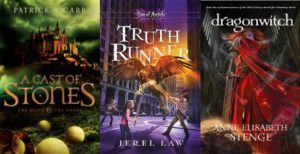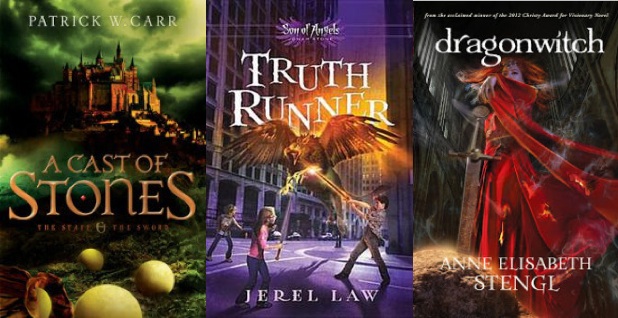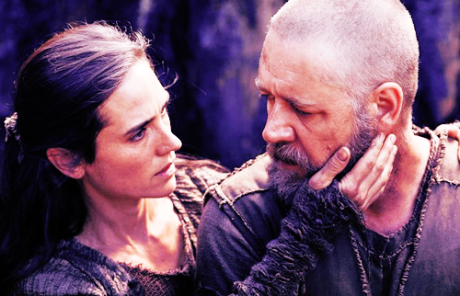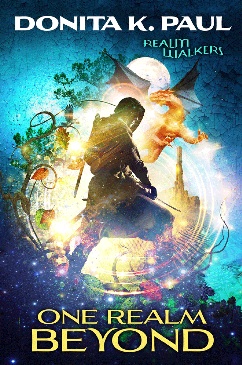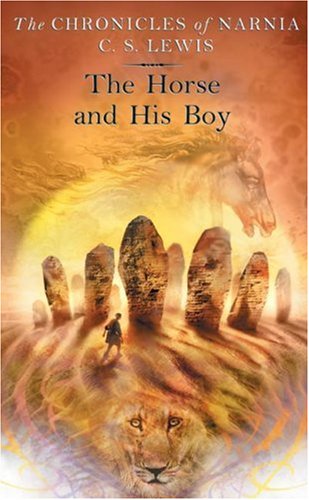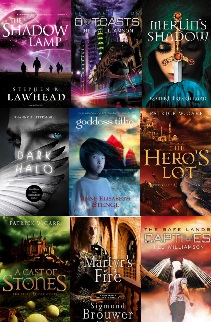The following is the first ever Spec Faith Fiction Friday–an excerpt from a Christian speculative novel. Today we’re featuring One Realm Beyond, book 1 of the Realm Walkers series by Donita Paul. Enjoy.
– – – – –
1
RAISING A RUCKUS
Cantor straddled the thick tree limb suspended less than three feet over his favorite fishing hole. Heâd fished from this spot for more than eighteen years, from the time he could barely straddle the fat limb âtil now, when the tips of his sandals almost brushed the surface of the clear, cold water. He watched the small fish circle below him, waiting for the big one just as he had been taught. His fishing mentor, Odem, probably took him fishing here before he was out of diapers. Cantor wouldnât want to share the limb now. Though the tree had grown with him over the years, he didnât think the branch would hold the weight of two grown men. He wasnât eager for a bath in the frigid water from the mountainâs runoff.
Still and patient, Cantor waited for the large carp he called Bully to rise and push the other fish out of the way. A sprinkle of thumb-sized chunks of bread floated on the water. One of the smaller guppies darted off to the side, and a huge, open mouth appeared under the surface. The fish snapped up a sodden crust.
Cantor hurled the stone in his hand. The rock thunked against the skull of his target. All the smaller fish deserted Bully, who floated on his side. With a grin, Cantor threw his leg over the limb and slipped into the knee-high water. He shivered in the icy snowmelt, grabbed his catch, and slogged to the shore.
Exposed roots riddled the steep bank, making irregular hand and foot holds. Cantor threw the fish onto the grass above his head and climbed out. Sitting cross-legged in the tall grass, he removed his sandals and put them on a rock to dry in the sun. He opened the pouch Ahma had sewn into his tunic and removed an undersized scabbard.
Heâd owned this small, sharp knife since childhood. Odem had visited on his sixth birthday and, against Ahmaâs protests, given the tool to him. Cantorâd thought himself very clever when he named the knife Slice, especially when Odem laughed in his loud bray that filled the tiny cabin. Ahma shook her head and fetched another piece of greenberry pie for him and Odem.
Sheâd caught Cantor that night picking his teeth with the blade. Boxing his ears, she told him if she caught him doing another stupid thing with âthat weapon,â sheâd take it away.
Cantor grinned as he applied Slice to the job of gutting the big carp. A couple of carrion birds landed in a tree nearby. Cantor nodded in their direction. âIâll leave you the tasty insides. I donât suppose you would agree to peaceably share between yourselves.â
The bigger of the two mountain crows spread his wings and threatened the smaller, cawing and crowding the other bird off the limb.
Cantor shook his head. âYeah, I didnât think so.â
He pulled a thin string of gut from the innards. With it in his hand, he aimed at the bird and snapped his fingers. The filament wrapped around the large scavengerâs beak. The string would work loose after the smaller bird had a chance at Cantorâs fishy offering.
He finished his chore and strung the fish on a switch cut from the longleaf tree. Cleaning his blade in the sandy soil, he heard the gentle whoosh of a portal opening. With a casual air he did not feel, he put the knife in its scabbard and the scabbard in his pouch.
Where was Tom? At the cabin with Ahma? Heâd last seen his mentorâs furry companion sunning himself on the front stoop. But Tom could be a stealthy canine, quiet like a cat sneaking up on a mouse.
With a searching look at the surrounding trees, he propped the switch on his shoulder, the large carp dangling behind him. He angled away from the portal as if it didnât make the hairs on the back of his neck tingle, as if it didnât give off the scent of new horizons, adventure, and intrigue, as if he hadnât a thought in his head about diving through.
Anyone watching would think he had only the intention of taking his catch home to dear Ahma for their dinner. Except Tom, of course. Tom had an uncanny sense of knowing what he planned. And Cantor had just used his talent to enhance his aim, not bothering to disguise he burst of energy. That ripple would be detected by any other being familiar with Primenâs gifts. Tom would have felt it.
Cantor made himself wait until the distance to the portal had shortened considerably. With a final, nonchalant inspection of the surrounding meadow, Cantor hauled in a deep breath, dropped the fish, and bolted toward the gaping hole in space. His heart quickened when he saw it was a horizontal portal. Vertical openings presented a shaft, which required scrambling up or plunging down to enter another plane.
If heâd outsmarted Tom, he was in for some fun. He pumped his legs harder.
The distinct sound of leathery wings unfolding caught his ear. He fought back a grin and redoubled the speed of his dash to freedom. The dragon on course to intercept him roared a warning. Accepting the challenge, Cantor pushed his muscles with all his might. If he could reach the portal first, he could dive and roll. The dragon in flight would have to land and squeeze through.
Cantor kept his eye on the opening. On the other side, he could see a street with people hurrying to and fro. A rush of air above him warned him just in time. He ducked and avoided the clutching claws of a brilliantly colored mor dragon as it swooped to catch him. The small, powerful beast was slightly larger than a full-grown cow. Cantor glanced up to see him dip one wing and neatly turn, barely losing momentum as he came back for another pass. Cantor refocused on the portal. Fifteen more feet.
The dragon dropped from the sky, approaching his target face on. He skimmed the high grass and rose to thud against Cantorâs chest with his own. The impact knocked Cantor down and pushed the air out of his lungs. He remained on the ground, staring up at the blue sky. Dragging air in with rasping, choking sounds, he rolled to his side and curled up to facilitate at least one life-sustaining breath.
The dragon landed and approached. Cantor would have liked to fake death, be still enough to confuse the beast stalking him, and get the better of the interfering animal. But he concentrated instead on breathing, pulling air in and pushing air out.
The dragonâs clawed foot rested on his shoulder, then with a pinch, he forced Cantor to roll onto his back.
In spite of the spasms racking his chest, Cantor recognized the wicked gleam in his tormentorâs eyes. The beast all but crowed with glee at having downed his prey. With a hop, the dragon sat on Cantorâs chest.
– – – – –
To continue reading the first chapter of One Realm Beyond, visit Christianbook. You can also purchase the book at Amazon, Barnes & Noble, Christianbook or wherever books are sold.
